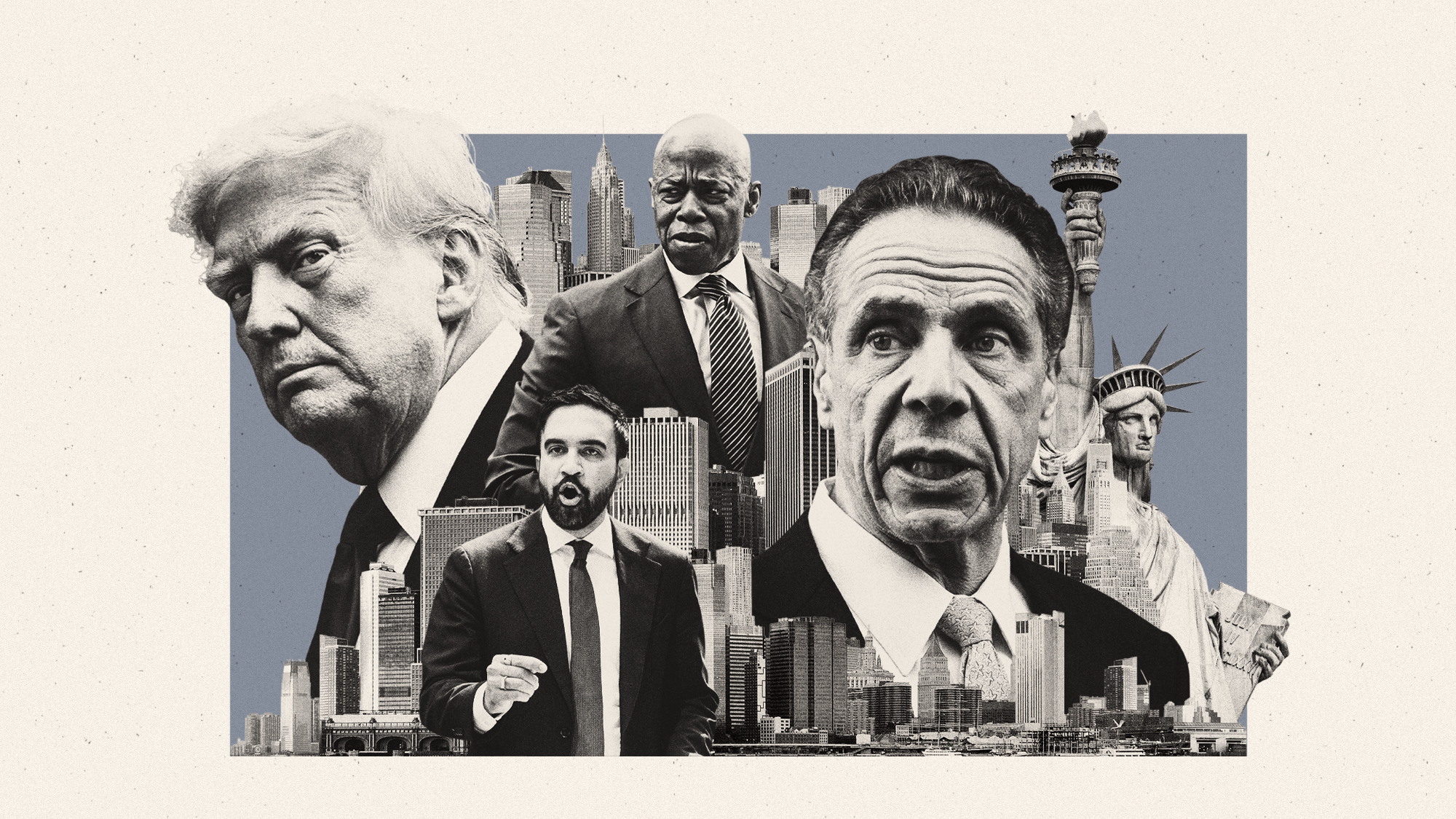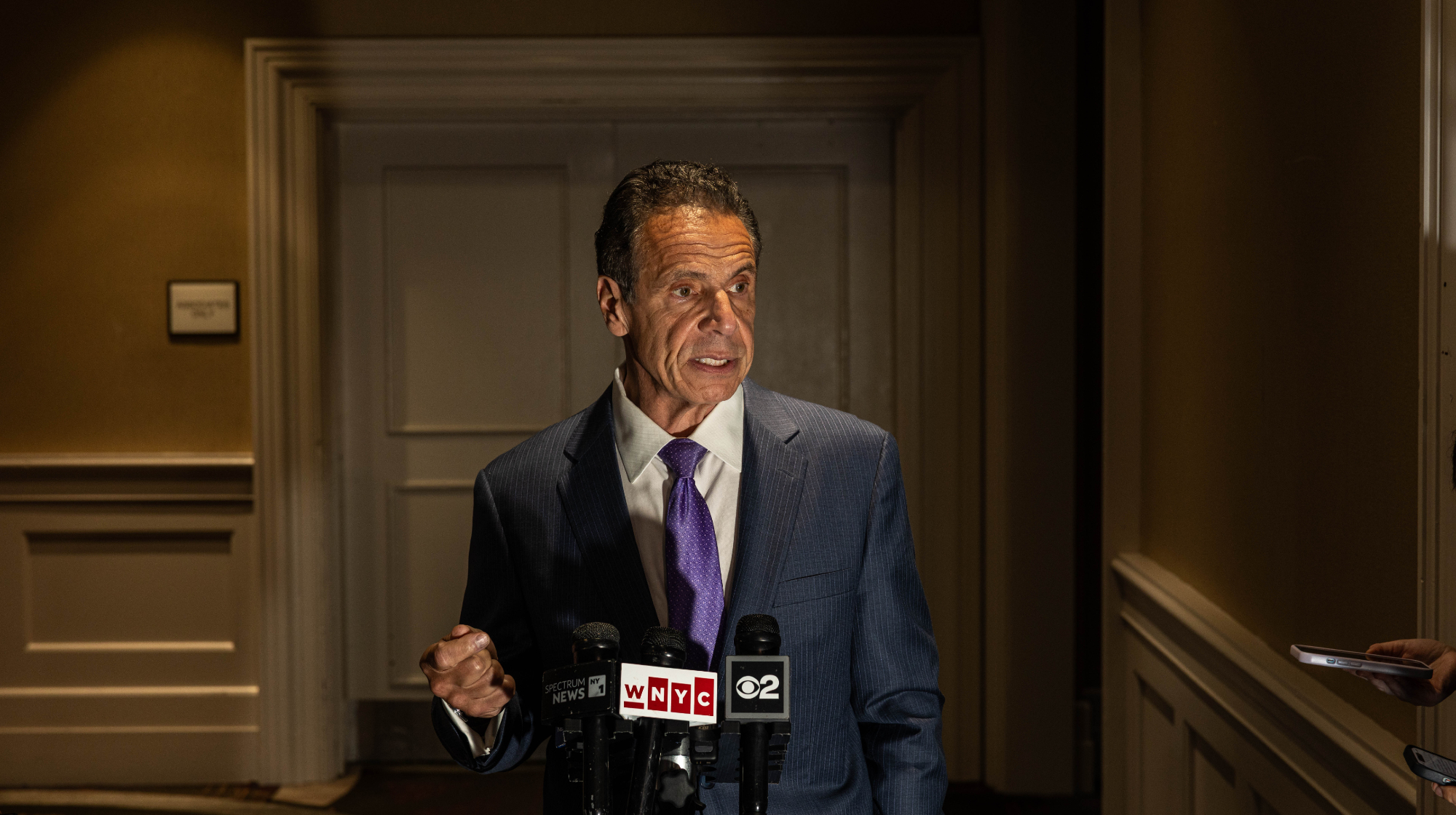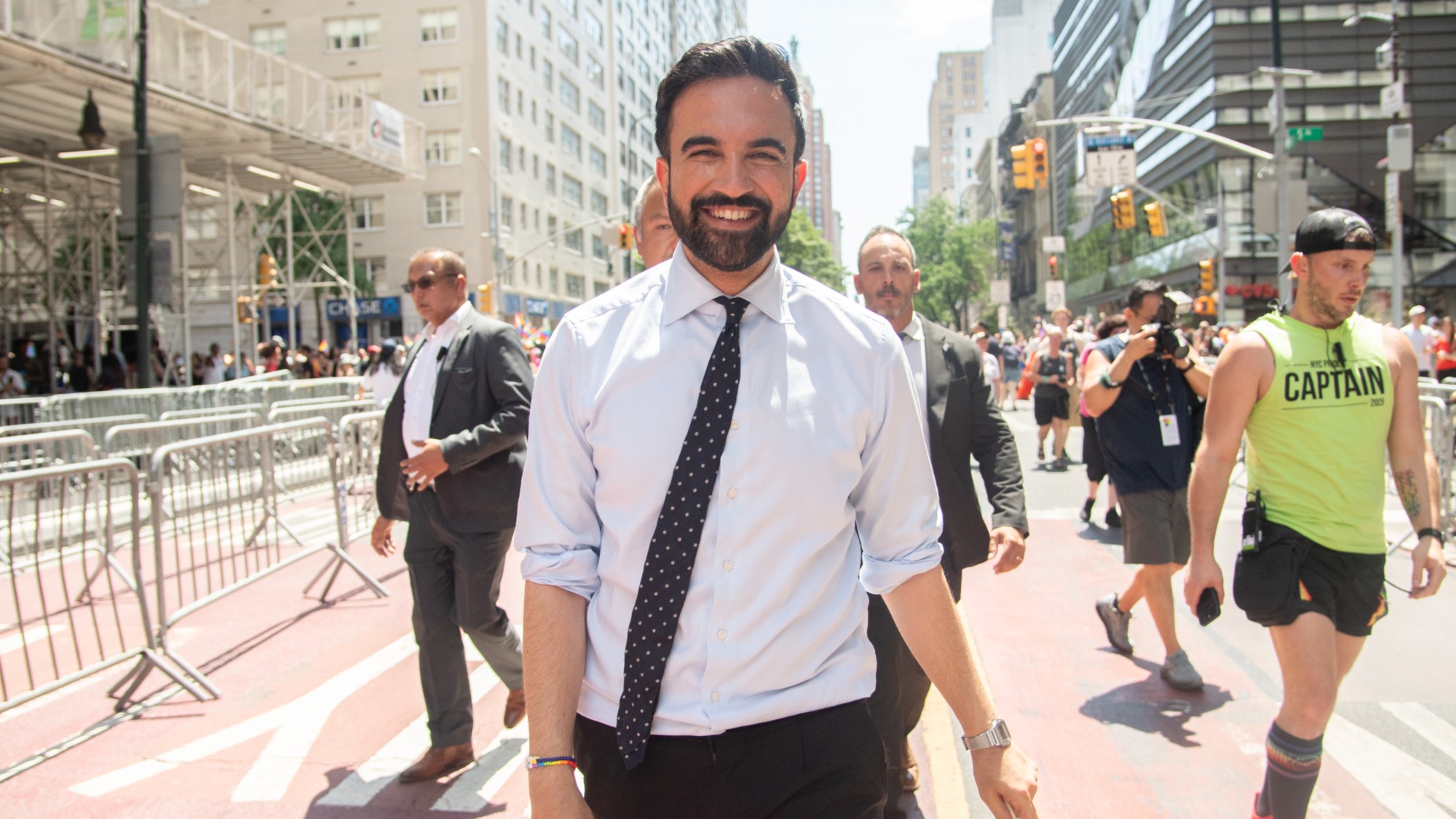Cuomo vs. Inslee: A COVID-19 tale of two governors
Cuomo got the credit. Inslee got the job done.


A free daily email with the biggest news stories of the day – and the best features from TheWeek.com
You are now subscribed
Your newsletter sign-up was successful
New York's beleaguered Governor Andrew Cuomo has not yet resigned or been impeached over his various scandals. Seven women so far have accused him of some form of sexual misconduct, he apparently tried to cover up the number of people who had died of COVID-19 in nursing homes, and seemingly every day new investigations are published into his administration's staggering corruption, but he still refuses to step down despite most of the state's Democratic officials calling for him to do so.
On the other side of the country, Washington's Jay Inslee is quietly finishing up arguably the best pandemic response record of any governor in the country. He proves that — contrary to popular myth — competent leadership does not look like a swaggering macho bully constantly going on television.
Let's take a look at the numbers. The New York Times recently published an investigation into why Seattle has had the lowest coronavirus death toll of any of the 20 largest metropolitan areas in the country. That city has seen just 64 deaths per 100,000 people — as compared to New York City, which has the worst figure in the country at 294 deaths. The Times interviewed various experts on the question, who pointed to effective coordination between the city and state leadership, the population's willingness to listen to government orders, the extensive public and private health industry in the region, and so on.
The Week
Escape your echo chamber. Get the facts behind the news, plus analysis from multiple perspectives.

Sign up for The Week's Free Newsletters
From our morning news briefing to a weekly Good News Newsletter, get the best of The Week delivered directly to your inbox.
From our morning news briefing to a weekly Good News Newsletter, get the best of The Week delivered directly to your inbox.
All those no doubt matter. But the most important single factor is probably the speed and aggressiveness of the initial response back in March last year.
As David Wallace-Wells writes in a long retrospective for New York comparing the generally dismal performances in the U.S. and Europe to the success stories in Southeast Asia, a hair-trigger immediate response seems to be at the top of the list of pandemic best practices. Whereas most European countries and the U.S. dithered and procrastinated for fear of doing unpopular things, only to be forced into doing much worse, for much longer, Taiwan and Vietnam slammed in controls (above all travel restrictions, border closures, mask requirements, and a test-trace-isolate system) so quickly they never needed to lock down at all. Conversely, the virus is so contagious that once it is widely circulating it is very difficult to eradicate entirely. China and Australia show that it takes an exceptionally severe lockdown to do so.
Furthermore, across the world the first waves have generally seen the most deadly case fatality rates, because countries got flat-footed and so cases came in a gigantic spike that overwhelmed hospitals, and because doctors had not yet learned how best to treat COVID-19. Later techniques (like "proning" patients so they could breathe more easily) sharply increased the survival rate in hospitals.
Now, Inslee's performance does not hold a candle to that of Vietnam or New Zealand. But the basic analysis still holds when comparing Washington and New York state. Many have forgotten this, but Seattle actually saw the first widespread, documented community spread of any city in the U.S. way back in February 2020 (though it may have simply been detected there first). Inslee responded with rapidly escalating control measures, culminating in a shelter-in-place order on March 23 (by which time most Washingtonians had already been at home for weeks).
A free daily email with the biggest news stories of the day – and the best features from TheWeek.com
Cuomo, by contrast, was inconsistent in his messaging, and quarreled with his public health authorities and top scientists. Most importantly, Cuomo kept up his compulsive feuding with New York Mayor Bill de Blasio, who was (in his characteristically clumsy way) at least trying to do something about the virus spreading exponentially throughout his city and into the New Jersey suburbs. On March 17, de Blasio told New York City residents to prepare for a shelter-in-place order. But Cuomo aggressively overruled him, only to issue his own "pause" order a few days later.
A later study estimated that if Cuomo had acted just one week sooner, 17,000 deaths in the New York area would have been avoided — and yet more lives would have been saved if he'd acted earlier still. Cuomo later made things worse by directing nursing homes to take COVID-positive residents, bullying nine of the state's top public health officials out of government, meddling idiotically with the vaccine rollout, and exploiting the pandemic to cut Medicaid. But the bulk of New York's deaths — something like three-fifths — happened during that original surge, when more than half of all COVID deaths in the country were happening in New York and New Jersey.
Now, Cuomo is not the only reason New York's institutions are so dysfunctional. But it certainly would have been possible for the state to match Washington's performance (which again wasn't all that great compared to real stellar international performers). Even if Cuomo had done 50 percent worse than Inslee, something like 45,000 residents of the New York metro area would be alive today.
As I wrote at the time, the slobberfest in some corners of the media over Cuomo's press conferences in March and April was deeply uncomfortable to watch, but returning to it today it is downright nauseating.
Rebecca Traister wrote a long profile of Cuomo for New York this week, now that his political career is in shambles. What she found was that his awful personality and appalling record of failure are not unrelated. On the contrary, he is a terrible, incompetent governor who got tens of thousands of people killed because he is a domineering bully and control freak. But just like Trump on The Apprentice, Cuomo was pretty good at playing Mr. Competent Governor on television — especially on superficial local news, where as Alex Pareene points out at The New Republic, the conventions of the form basically rule out any exploration of his horrible record, because it would be too complicated.
By all accounts, Inslee's political personality is basically the opposite of Cuomo's. Inslee did not inherit his political prominence from his father as Cuomo did, he worked his way up from a modest profile: from the Washington state legislature, to the House of Representatives, to the governorship of Washington. He has a fairly conventional Democratic Party record (except for climate change, where he has been an evangelist for decades), but profilers report that the climb has given him some perspective and humility. He also appears to be basically a decent guy — at the least, there have not been dozens of stories from former staffers complaining about being constantly abused.
Whatever the reason, Inslee did not treat the pandemic as an opportunity for preening in front of the cameras constantly or to prove his dominance over the state. He did give regular press briefings, but in the process often deferred to scientists and other officials to lend some additional nonpartisan credibility. Instead of starting snarling slap-fights with the mayor of his state's largest city, he worked closely with her to coordinate messaging and policy. Instead of driving out his top public health officials, he set up a pandemic control center with them so the virus could be monitored and resources efficiently allocated. And he did not write a book boasting about how great he was before a single vaccine had been delivered.
That's what basic professionalism and competence looks like — a frankly kind of boring dude who works well with others, listens to experts, and doesn't view absolutely everything on Earth through the lens of "how can I make this about me?"
Cuomo's political success has been based on the idea that being a jerk gets political results. He says it in his own book: "Show me a person who is not controlling, and I'll show you a person who is probably not highly successful." Forty-five thousand New Yorkers and New Jerseyans would dispute this definition of "highly successful," if they were still alive.
Ryan Cooper is a national correspondent at TheWeek.com. His work has appeared in the Washington Monthly, The New Republic, and the Washington Post.
-
 Political cartoons for February 19
Political cartoons for February 19Cartoons Thursday’s political cartoons include a suspicious package, a piece of the cake, and more
-
 The Gallivant: style and charm steps from Camber Sands
The Gallivant: style and charm steps from Camber SandsThe Week Recommends Nestled behind the dunes, this luxury hotel is a great place to hunker down and get cosy
-
 The President’s Cake: ‘sweet tragedy’ about a little girl on a baking mission in Iraq
The President’s Cake: ‘sweet tragedy’ about a little girl on a baking mission in IraqThe Week Recommends Charming debut from Hasan Hadi is filled with ‘vivid characters’
-
 The billionaires’ wealth tax: a catastrophe for California?
The billionaires’ wealth tax: a catastrophe for California?Talking Point Peter Thiel and Larry Page preparing to change state residency
-
 Bari Weiss’ ‘60 Minutes’ scandal is about more than one report
Bari Weiss’ ‘60 Minutes’ scandal is about more than one reportIN THE SPOTLIGHT By blocking an approved segment on a controversial prison holding US deportees in El Salvador, the editor-in-chief of CBS News has become the main story
-
 Has Zohran Mamdani shown the Democrats how to win again?
Has Zohran Mamdani shown the Democrats how to win again?Today’s Big Question New York City mayoral election touted as victory for left-wing populists but moderate centrist wins elsewhere present more complex path for Democratic Party
-
 Millions turn out for anti-Trump ‘No Kings’ rallies
Millions turn out for anti-Trump ‘No Kings’ ralliesSpeed Read An estimated 7 million people participated, 2 million more than at the first ‘No Kings’ protest in June
-
 Why does Trump keep interfering in the NYC mayoral race?
Why does Trump keep interfering in the NYC mayoral race?Today's Big Question The president has seemingly taken an outsized interest in his hometown elections, but are his efforts to block Zohran Mamdani about political expediency or something deeper?
-
 Ghislaine Maxwell: angling for a Trump pardon
Ghislaine Maxwell: angling for a Trump pardonTalking Point Convicted sex trafficker's testimony could shed new light on president's links to Jeffrey Epstein
-
 Cuomo announces third-party run for NYC mayor
Cuomo announces third-party run for NYC mayorSpeed Read He will go up against progressive Democratic powerhouse Zohran Mamdani and incumbent Mayor Eric Adams
-
 Zohran Mamdani: the young progressive likely to be New York City's next mayor
Zohran Mamdani: the young progressive likely to be New York City's next mayorIn The Spotlight The policies and experience that led to his meteoric rise
